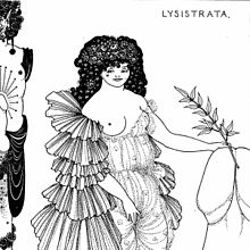
Overview
Synopsis
*Lysistrata *is one of the earliest theatrical comedies to explore the dynamics between men and women in society. Set in Ancient Greece during the Peloponnesian War, the play follows Lysistrata, a strong-willed Athenian woman who is determined to bring an end to the ongoing conflict. Believing that dramatic action is needed to force peace negotiations, she unites the women of Greece in a bold plan: they will withhold marital intimacy until their husbands agree to pursue peace. As tensions rise, the men grow increasingly frustrated, leading to a humorous and pointed clash of wills. Ultimately, the plan works, and the warring states agree to negotiate. The play concludes with reconciliation, celebration, and a hopeful message about the power of unity and determination.
Show Information
Context
Lysistrata was first performed in Ancient Greece in 411 BC. It stems from the middle section of Aristophanes’ career, when he was beginning to move away from the theatrical conventions of Old Comedy. It is best known today as one of the earliest analyses of sexual relations and societal expectation in a male-dominated society. Around 411 BC, Greek theatre was an extremely popular form of entertainment as it spoke to the common man and tended to address political issues of the time.
to read the context for Lysistrata and to unlock other amazing theatre resources!Plot
Act One
Lysistrata is frustrated by the continuing war between the Greek states and desperately wants to bring peace to the country. She has planned a meeting between all of the women of Greece to discuss her plan to end the Peloponnesian War once and for all. However, aside from her neighbor, Calonice, the women are all late. As Lysistrata waits for the women of Sparta, Thebes, and other areas to meet her she curses the weakness of her sex. Lysistrata plans to ask the women to refuse
to read the plot for Lysistrata and to unlock other amazing theatre resources!Characters
| Name | Part Size | Gender | Vocal Part |
|---|---|---|---|
|
Lead |
Female |
Spoken |
|
|
Supporting |
Female |
Spoken |
|
|
Supporting |
Female |
Spoken |
|
|
Supporting |
Female |
Spoken |
|
|
Supporting |
Male |
Spoken |
|
|
Supporting |
Female |
Spoken, Soprano, Mezzo-Soprano, Alto |
|
|
Supporting |
Female |
Spoken |
|
|
Supporting |
Male |
Spoken, Tenor, Baritone, Bass |
|
|
Supporting |
Male |
Spoken |
|
|
Ensemble |
Female |
Spoken, Silent |
Songs
A song with an asterisk (*) before the title indicates a dance number; a character listed in a song with an asterisk (*) by the character's name indicates that the character exclusively serves as a dancer in this song, which is sung by other characters.
Monologues
Scenes
Key Terms
Sorry! We do not currently have terms for this guide.
Videos
Quizzes
Themes, Symbols & Motifs
Sorry! We do not currently have learning modules for this guide.
Quote Analysis
Sorry! We do not currently have learning modules for this guide.
